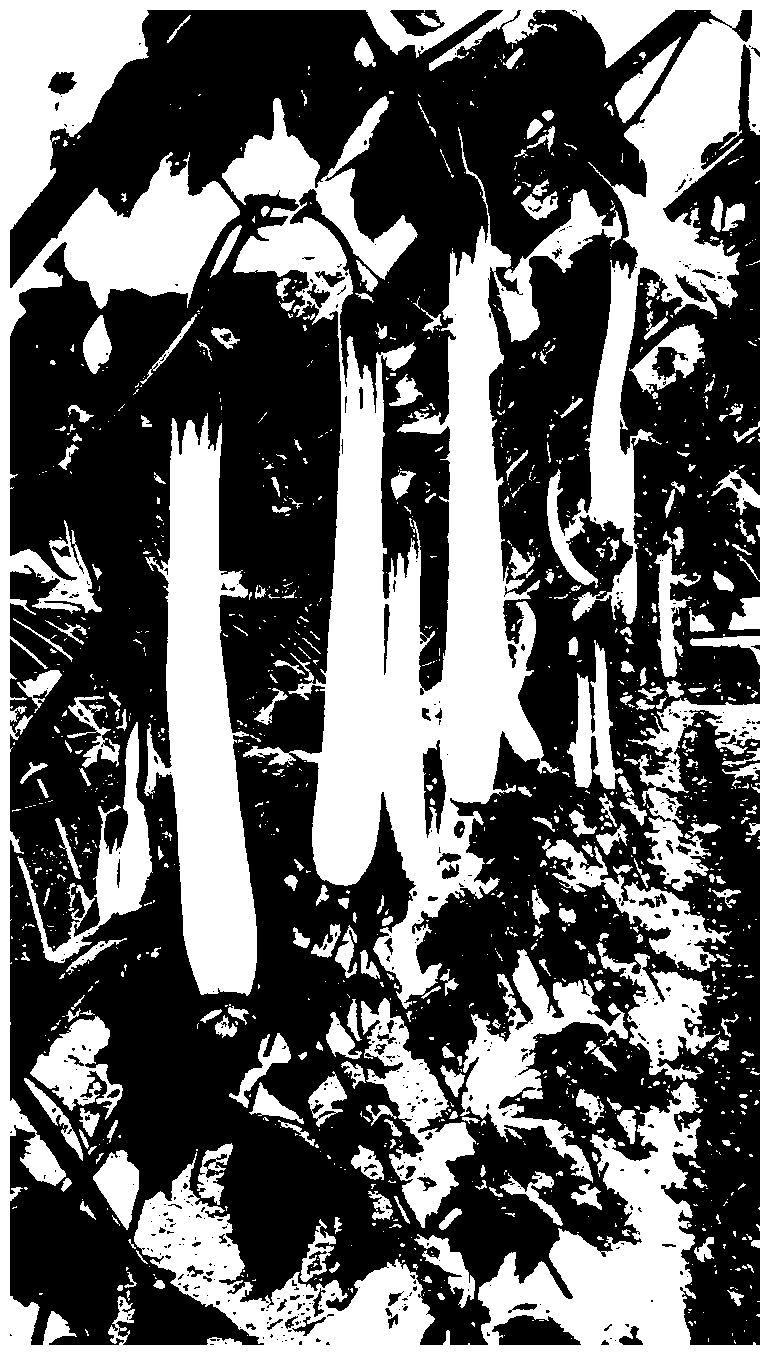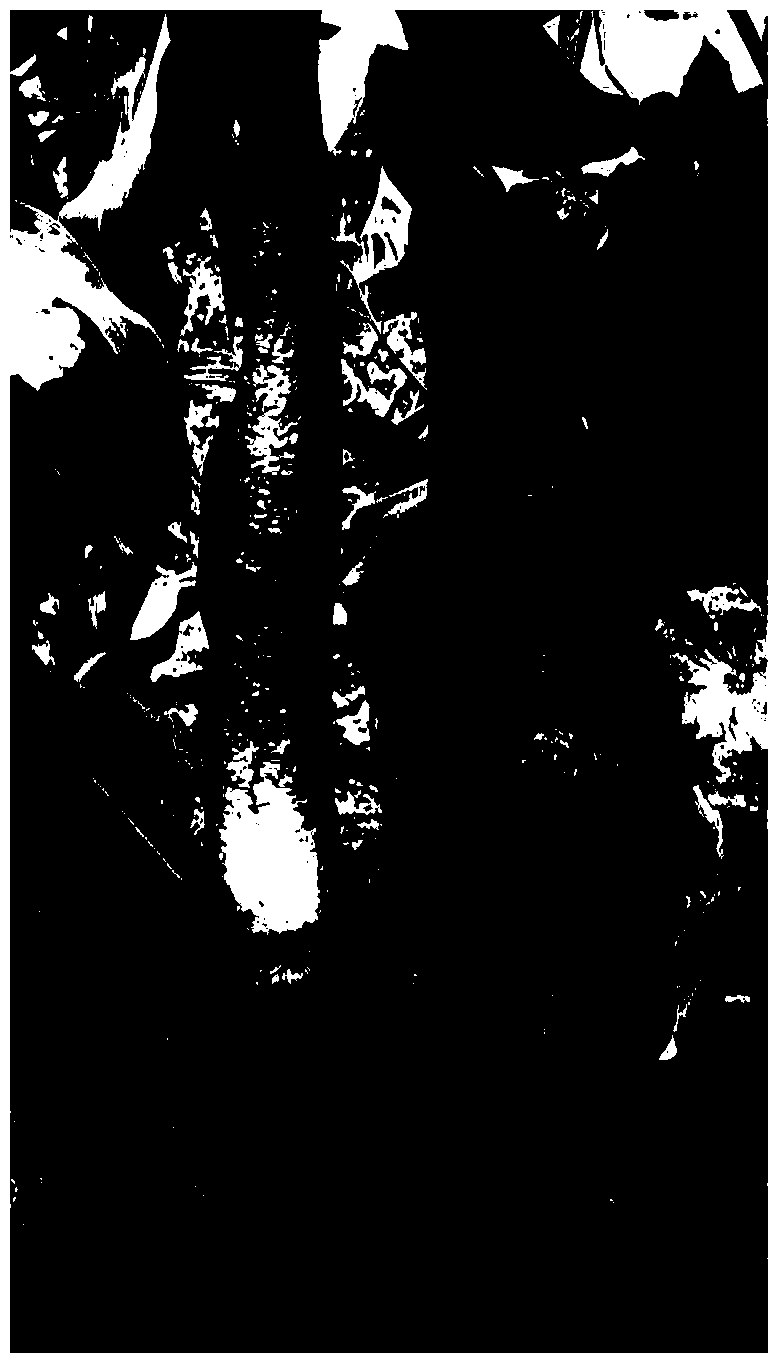Hybrid breeding method for low-browning towel gourd
A technology of hybrid breeding and loofah, which is applied in the field of hybrid breeding of low-browning common loofah varieties, can solve the problems of sensory, taste and nutritional value decline, pulp prone to browning, and difficulty in meeting consumers' requirements for high-quality loofah, etc. Achieve the effects of improving the variety structure of loofah, enriching consumption types, and reducing the degree of browning
- Summary
- Abstract
- Description
- Claims
- Application Information
AI Technical Summary
Problems solved by technology
Method used
Image
Examples
Embodiment 1
[0025] Embodiment 1: Obtaining of low-browning material LWB-02
[0026] "Baiyushuang" is a local variety in Wuhan City, Hubei Province. This variety is resistant to high temperature in summer and has yellowish-white skin. The biggest advantage is that the melon flesh does not brown or browns less after cooking. In March 2000, "Baiyushuang" loofah was purchased from the Dadongmen Seed Market in Wuhan City, Hubei Province as the raw material, and it was planted in Jiufeng Township, Hongshan District, Wuhan City on April 20 of the same year. The female flower nodes are around 15 nodes, the fruit is long and cylindrical, high temperature resistant, and low browning. In addition, it also has the disadvantages of greenish rind color, irregular melon length and rind surface characteristics, and poor commerciality. According to the breeding goal of "low node position of the first female flower, melon-shaped elongated tube, yellow-white skin, slightly wrinkled, low browning of melon f...
Embodiment 2
[0028] Embodiment 2: Obtaining of low-browning material LJ-01
[0029] "Yulu" is a local variety in Yiwu, Zhejiang Province. This variety has medium growth potential, thicker fruit from the top to the middle, and a thinner tail. It is in the shape of a short stick. Pale green, firm, hydrated, non-browning. In March 2000, "Yulu" loofah was purchased from No. 120 Tongji Street, Jinhua City, Zhejiang Province as the original material. It was planted in Jiufeng Township, Hongshan District, Wuhan City on April 20 of the same year. A single plant, according to the breeding goal of "the first female flower is low, the melon shape is relatively straight, the melon skin is white, smooth, shiny, and the melon flesh is not browned", after 6 generations of single plant self-breeding, a genetically stable Advanced inbred line LJ-01. The inbred line LJ-01 has medium growth potential, palmately lobed leaves, dark green leaves, and yellow spots on the surface. The first female flower node i...
Embodiment 3
[0032] Preparation of low browning hybrid first generation
[0033] In 2007, the high-generation inbred line LWB-02 of the low-browning loofah "Bai Yushuang" was used as the female parent, and the inbred line LJ-01 of the non-browning loofah "Yulu" was used as the male parent to make common loofah Hybrid "Yulong".
[0034] Procedures for breeding the variety "Yulong"
[0035] ① Sowing seedlings, sowing on March 10, generally the female parent should be sown 5 days earlier than the male parent; ② Colonization, the seedlings can be planted at the stage of 3-4 true leaves, the plant spacing is 40-50cm, the row spacing is 3-4m, and wooden stakes are used Or cement piles as supports, wires and climbing vines on the roof, planted in an inverted "U" shape, and the ratio of parent to parent is 1:12; ③Field, water and fertilizer management, remove all side vines on the main vine before the plant climbs the roof, During the whole growth period, it is necessary to ensure the ventilatio...
PUM
 Login to View More
Login to View More Abstract
Description
Claims
Application Information
 Login to View More
Login to View More - R&D
- Intellectual Property
- Life Sciences
- Materials
- Tech Scout
- Unparalleled Data Quality
- Higher Quality Content
- 60% Fewer Hallucinations
Browse by: Latest US Patents, China's latest patents, Technical Efficacy Thesaurus, Application Domain, Technology Topic, Popular Technical Reports.
© 2025 PatSnap. All rights reserved.Legal|Privacy policy|Modern Slavery Act Transparency Statement|Sitemap|About US| Contact US: help@patsnap.com



